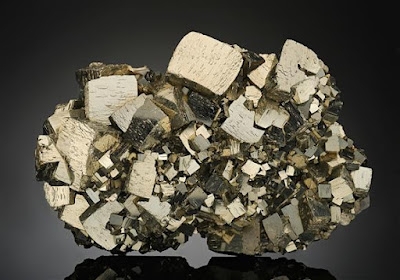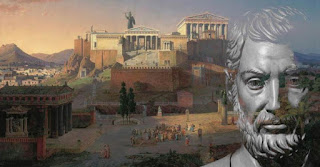 |
| All that glitters is not gold! Or at least, is not worth as much as gold. Here, richly interwoven cubic crystals of light metallic golden pyrite – also known as fool’s gold – are rare but nowhere near as valuable. Why’s that? |
By Keith Tidman
One of the notable contributions of the Enlightenment philosopher, Adam Smith, to the development of modern economics concerned the so-called ‘paradox of value’.
That is, the question of why one of the most-critical items in people’s lives, water, is typically valued far less than, say, a diamond, which may be a nice decorative bauble to flaunt but is considerably less essential to life? As Smith couched the issue in his magnum opus, titled An Inquiry Into the Nature and Causes of the Wealth of Nations (1776):
‘Nothing is more useful than water: but it will purchase scarcely anything; scarcely anything can be had in exchange for it. A diamond, on the contrary, has scarcely any use-value; but a very great quantity of other goods may frequently be had in exchange for it’.It turns out that the question has deep roots, dating back more than two millennia, explored by Plato and Aristotle, as well as later luminaries, like the seventeenth-century philosopher John Locke and eighteenth-century economist John Law.
For Aristotle, the solution to the paradox involved distinguishing between two kinds of ‘value’: the value of a product in its use, such as water in slaking thirst, and its value in exchange, epitomised by a precious metal conveying the power to buy, or barter for, another good or service.
But, in the minds of later thinkers on the topic, that explanation seemed not to suffice. So, Smith came at the paradox differently, through the theory of the ‘cost of production’ — the expenditure of capital and labour. In many regions of the world, where rain is plentiful, water is easy to find and retrieve in abundance, perhaps by digging a well, or walking to a river or lake, or simply turning on a kitchen faucet. However, diamonds are everywhere harder to find, retrieve, and prepare.
Of course, that balance in value might dramatically tip in water’s favour in largely barren regions, where droughts may be commonplace — with consequences for food security, infant survival, and disease prevalence — with local inhabitants therefore rightly and necessarily regarding water as precious in and of itself. So context matters.
Clearly, however, for someone lost in the desert, parched and staggering around under a blistering sun, the use-value of water exceeds that of a diamond. ‘Utility’ in this instance is how well something gratifies a person’s wants or needs, a subjective measure. Accordingly, John Locke, too, pinned a commodity’s value to its utility — the satisfaction that a good or service gives someone.
For such a person dying of thirst in the desert, ‘opportunity cost’, or what they could obtain in exchange for a diamond at a later time (what’s lost in giving up the other choice), wouldn’t matter — especially if they otherwise couldn’t be assured of making it safely out of the broiling sand alive and healthy.
But what if, instead, that same choice between water and a diamond is reliably offered to the person every fifteen minutes rather than as a one-off? It now makes sense, let’s say, to opt for a diamond three times out of the four offers made each hour, and to choose water once an hour. Where access to an additional unit (bottle) of water each hour will suffice for survival and health, securing the individual’s safe exit from the desert. A scenario that captures the so-called ‘marginal utility’ explanation of value.
According to ‘marginal utility’, then, a person will use a commodity to meet a need or want, based on perceived hierarchy of priorities. In the nineteenth century, the Austrian economic theorist Eugen Ritter von Böhm-Bawerk provided an illustration of this concept, exemplified by a farmer owning five sacks of grain:
If one of those bags is inexplicably lost, the farmer will not then reduce each of the remaining activities by one-fifth, as that would thoughtlessly cut into higher-priority needs. Instead, he will stop feeding the birds, deemed the least-valuable activity, leaving intact the grain for the four more-valuable activities in order to meet what he deems greater needs.
- The farmer sets aside the first sack to make bread, for the basics of survival.
- He uses the second sack of grain to make yet more bread so that he’s fit enough to perform strenuous work around the farm.
- He devotes the third sack to feed his farm animals.
- The fourth he uses in distilling alcohol.
- And the last sack of grain the farmer uses to feed birds.
Accordingly, the next least-productive (least-valuable) sack is the fourth, set aside to make alcohol, which would be sacrificed if another sack is lost. And so on, working backwards, until, in a worst-case situation, the farmer is left with the first sack — that is, the grain essential for feeding him so that he stays alive. This situation of the farmer and his five sacks of grain illustrates how the ‘marginal utility’ of a good is driven by personal judgement of least and highest importance, always within a context.
Life today provides contemporary instances of this paradox of value.
Consider, too, collectables like historical stamps and ancient coins. Afar from their original purpose, these commodities no longer have use-value. Yet, ‘a very great quantity of other goods may frequently be had in exchange for them’, to evoke Smith’s diamond analogue. Factors like scarcity, condition, provenance, and subjective constructs of worth in the minds of the collector community fuel value, when swapping, selling, buying — or exchanging for other goods and services.









